What is horse betting? Horse betting, also known as horse racing betting, is a popular form of gambling that has been enjoyed for centuries. Originating in Great Britain in the early 1600s, horse betting involves placing bets on the final placement of horses in a race. Whether you’re a seasoned bettor or new to the world of horse racing, understanding the basics of horse betting is essential to make informed wagers and enjoy the thrill of the races.
Key Takeaways:
- Horse betting is a form of gambling that involves placing bets on the final placement of horses in a race.
- Parimutuel betting is the most common form of horse racing betting, where gamblers’ money is pooled and shared among the winners.
- Bookmakers also provide betting opportunities by setting odds on the horses.
- Basic horse racing bets include win, place, and show, while exotic wagers involve predicting the placement of multiple horses in one or multiple races.
- Understanding the odds, analyzing past performances, and considering various factors such as the horse’s form, jockey, and trainer are crucial for successful horse betting.
The Basics of Horse Betting
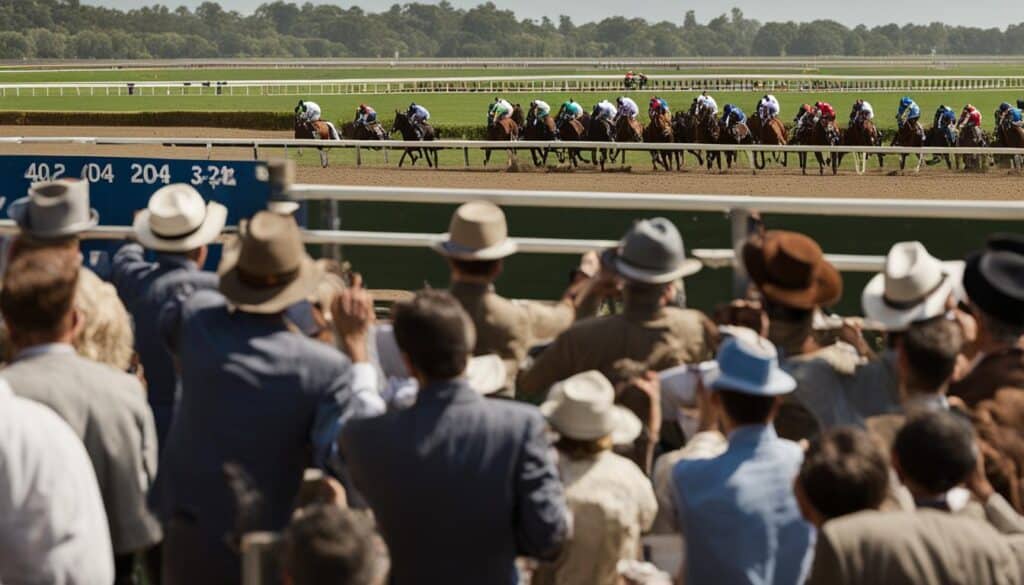
When it comes to horse racing, understanding the basics of horse betting is essential. Whether you’re a beginner or a seasoned bettor, knowing how to bet on horses can enhance your race day experience. Let’s explore the fundamental horse race betting basics and get you started on your betting journey.
There are three basic bets in horse racing that every bettor should be familiar with: win, place, and show. These bets are considered low-risk options and are great starting points for beginners.
- A win bet is a bet on a horse to finish first. If your chosen horse crosses the finish line in first place, you win the bet.
- A place bet is a bet on a horse to finish in either first or second place. If your selected horse finishes either first or second, you win the bet.
- A show bet is a bet on a horse to finish in the top three positions. If your chosen horse finishes first, second, or third, you win the bet.
Once you become more comfortable with the basic bets, you can explore higher-risk, higher-reward exotic bets. These bets involve predicting multiple horse placements in one or multiple races. Some popular exotic bets include exacta, trifecta, and pick 6.
Understanding the odds is crucial in horse betting. Odds represent the probability of a horse winning a race and determine the potential payout. Analyzing past performances, assessing a horse’s form, jockey, trainer, and other factors can help you make informed betting decisions.
As with any form of gambling, it’s important to set a budget and bet responsibly. Horse betting can be thrilling and exciting, but it’s essential to approach it with a level-headed mindset. Start with small bets and gradually increase your stakes as you gain more experience and confidence.
Quote:
“Horse race betting is a unique blend of strategy, analysis, and chance. The thrill of watching your chosen horse cross the finish line ahead of the competition is unmatched.”
Remember, horse betting is not just about making money; it’s about immersing yourself in the excitement and suspense of the races. Whether you’re attending a race in person or betting online, horse betting offers an adventure like no other. So, dive into the world of horse racing, study the form guides, and place your bets with confidence.
Types of Bets in Horse Racing
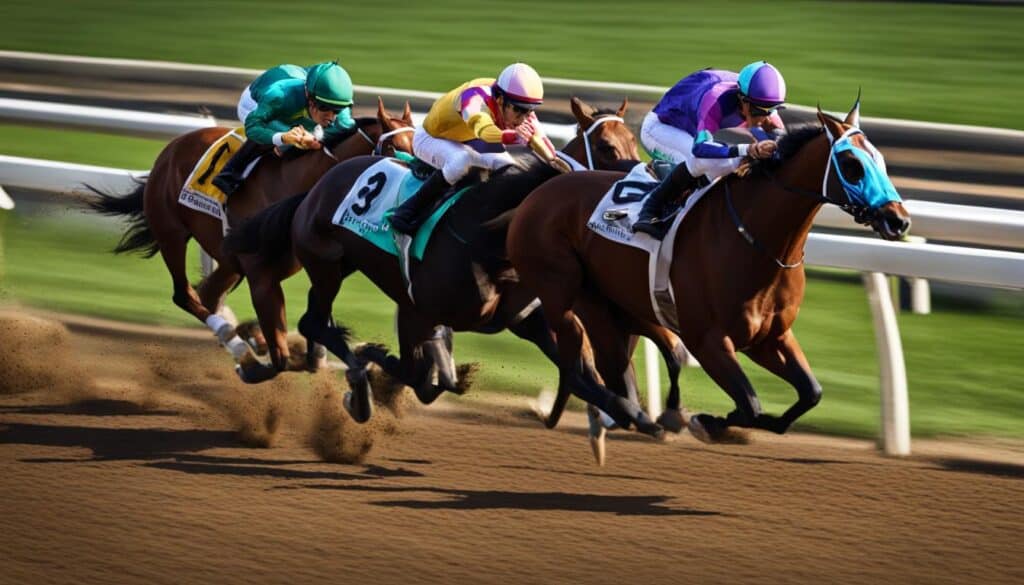
In horse racing, there are different types of bets that you can place. Understanding these bet types is essential for maximizing your chances of winning. Let’s explore some of the most popular bets in horse racing:
- Exacta: An exacta bet requires you to predict the first two finishers of a race in exact order. It offers higher payouts but is more challenging to win.
- Place: Place betting is when you bet on a horse to finish in the top two positions. If your chosen horse finishes first or second, you win your bet. Place bets have lower payouts compared to win bets but offer a higher chance of winning.

- Each Way: Each way betting is a combination of win and place betting, where you split your bet between a win bet and a place bet. This means that if your horse wins the race, you receive both the win and place payouts. If your horse finishes in the top two positions, you receive the place payout.
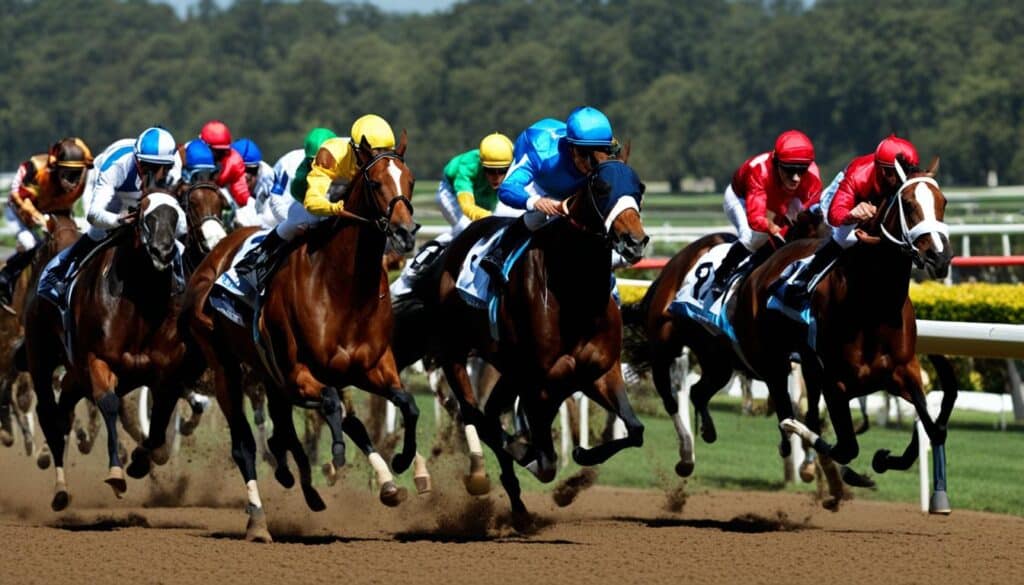
- Double: A double bet requires you to pick the winners of two consecutive races. Both horses must win their respective races for you to win the bet. Double bets offer higher payouts compared to single race bets but are more challenging to win.
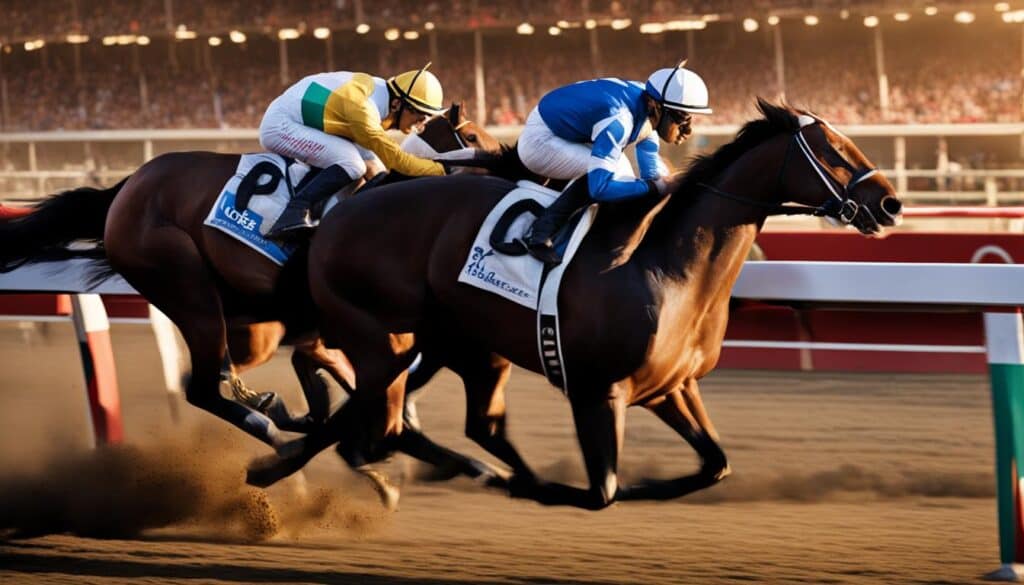
- Daily Double: Daily double is a type of double bet that is offered on the first two races of the day. You must correctly predict the winners of both races to win the bet. Daily double bets can be an exciting way to kickstart your day of horse racing betting.
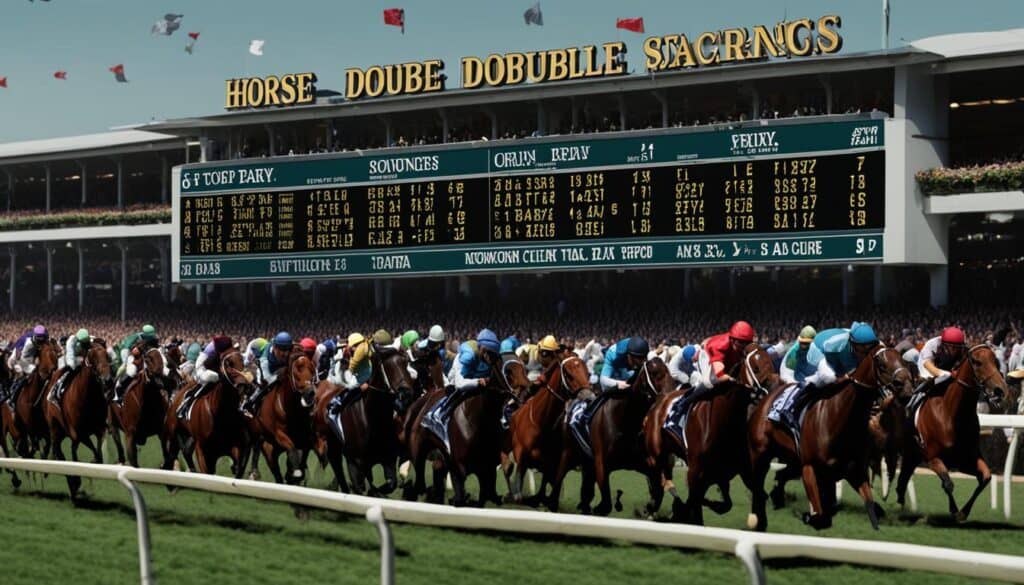
These are just a few examples of the many types of bets available in horse racing. Each bet type offers a unique betting experience and varying levels of risk and reward. The key to successful horse racing betting is understanding the different bet types and selecting the ones that suit your betting strategy and risk tolerance.
Understanding Exotic Wagers

Exotic wagers in horse racing are bets that go beyond the basic win, place, and show bets. These bets involve predicting the placement of multiple horses in one or multiple races. Examples of exotic wagers include exacta, trifecta, pick 6, and pick 4.
An exacta bet requires you to predict the first two finishers in exact order. It’s a challenging yet rewarding bet that offers higher payouts. A trifecta bet takes this a step further and requires you to pick the first three finishers in exact order. This type of bet offers even greater payouts, but the difficulty level increases.
“Exotic wagers in horse racing are like solving a puzzle. The thrill and potential returns of predicting the placement of multiple horses in a race can be incredibly rewarding. However, they require careful analysis and a deep understanding of each horse’s abilities, track conditions, and recent performances.”
The pick 6 is a multi-race bet where you must pick the winners of six consecutive races. This is a challenging bet that can result in substantial winnings if you’re able to correctly predict the outcomes. Similarly, the pick 4 requires you to pick the winners of four consecutive races.
Exotic wagers offer an exciting opportunity to test your horse racing knowledge and strategy. While they can be more challenging to win, the potential payouts make them enticing for experienced bettors.
Betting Exchanges and the United States Market
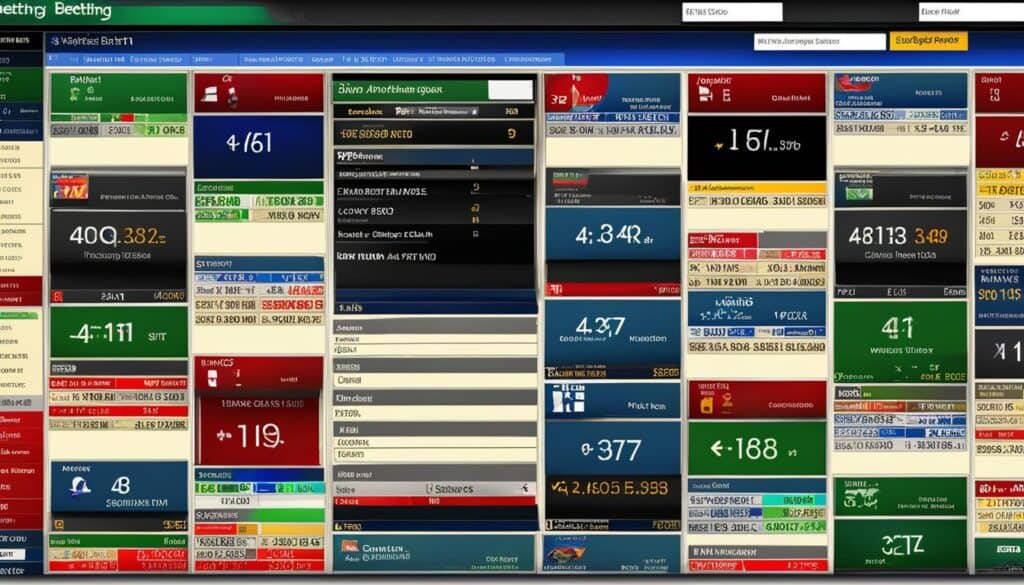
In addition to traditional betting with bookmakers, punters can also use betting exchanges to back and lay money on horse races. Betting exchanges allow punters to act as bookmakers and set their own odds. This offers a unique opportunity for bettors to take on the role of a bookmaker and potentially profit from their bets in a different way.
In the United States, horse race betting is regulated at the state level, and it varies from state to state. Pari-mutuel betting is legal in 32 states and involves betting on horses through a tote system. This means that the bets of all participants are pooled together, and the winnings are distributed proportionally among the winners after a deduction is made. Pari-mutuel betting is a popular form of horse race betting, as it ensures fair and transparent odds.
Due to the complex regulatory landscape, online horse race betting in the United States is also subject to state laws. Some states allow online betting platforms to offer their services, while others restrict or prohibit it. Bettors interested in online horse race betting should familiarize themselves with the laws of their specific state.
The legal market handle on horse racing in the United States was over $11 billion in 2018. However, it is important to note that these numbers only account for the legal market. The illegal sports betting market is estimated to be much larger, with predictions of significantly higher numbers. This highlights the popularity and widespread participation in horse race betting in the United States.
The Kentucky Derby
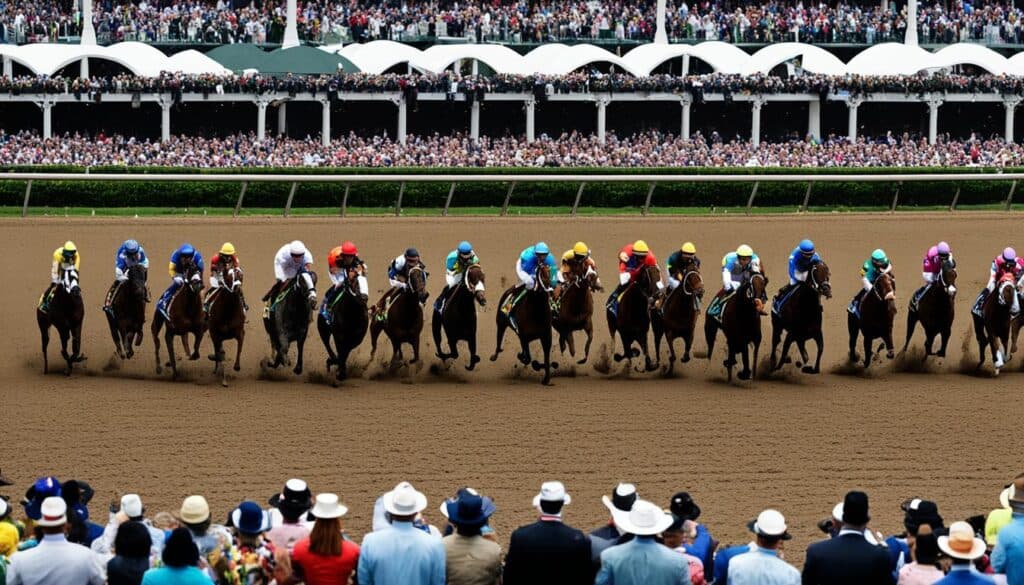
The Kentucky Derby, also known as “The Run For The Roses,” is the most famous horse race in the United States. Held annually on the first Saturday in May at Churchill Downs, it attracts a large number of spectators and bettors. With its rich history and tradition, the Kentucky Derby is considered a highlight of the horse racing calendar.
In 2019, a staggering $149.9 million was wagered on the race, with $24.6 million bet online. The Kentucky Derby offers a wide range of betting opportunities for both seasoned bettors and newcomers to horse racing.
As the crowd gathers to watch the thrilling race, bettors have the chance to place their bets and experience the excitement of the sport firsthand. Whether you are a novice punter or an experienced bettor, the Kentucky Derby provides an opportunity to immerse yourself in the world of horse racing.
Horse Racing in Hong Kong

Hong Kong is home to one of the largest horse racing betting circles in the world. The Hong Kong Jockey Club, founded in 1884, generates the largest horse racing revenue globally.
In 2014-2015, the Hong Kong Jockey Club gained an average turnover of HK$138.8 million per race. The revenue generated by the club makes it the largest taxpayer for the government.
Horse racing is deeply ingrained in the local culture and seen as an investment opportunity.
Hong Kong is home to one of the largest horse racing betting circles in the world.
Horse Racing in Australia
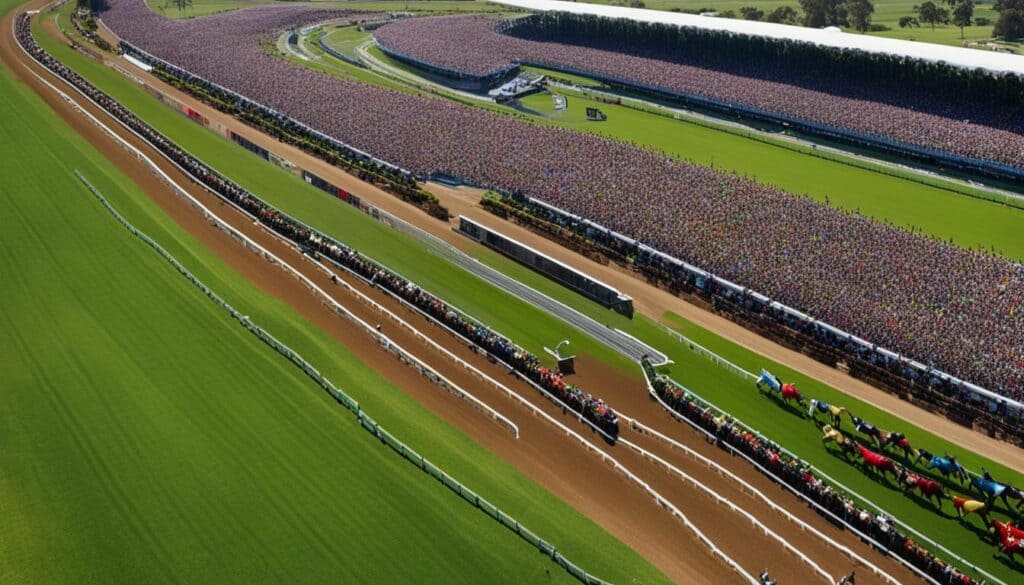
Horse racing is a beloved and widely popular sport in Australia, with a significant number of Australians engaging in horse race betting each year. In fact, nearly one million Australians participate in gambling on dog racing or horse racing.
The Melbourne Cup, known as “the race that stops a nation,” is undoubtedly the most prestigious and iconic horse race in Australia. This race, held annually on the first Tuesday of November at Flemington Racecourse in Melbourne, attracts massive betting activity. In 2014 alone, an estimated $300 million was wagered on the Melbourne Cup, highlighting the immense popularity and excitement surrounding the event.
Australians have a passion for horse racing, and it reflects in their annual expenditure on race betting. On average, Australians spend around $1,300 per year on race betting, demonstrating the significance of the sport in their culture. In total, the race betting expenditure in Australia amounts to approximately $1.27 billion, underlining the immense scale and enthusiasm for horse race betting in the country.
Horse Racing in the United Kingdom

Horse race betting in the United Kingdom is wide and varied. The majority of betting is done through bookmakers, both offline and online. Off-course horse racing betting turnover in Great Britain amounted to £4.3 billion between April 2017 and March 2018. However, the pari-mutuel market in the UK is small compared to fixed odds wagering. The number of betting shops in the UK is expected to decrease significantly due to government restrictions on Fixed Odds Betting Terminals.
Guide to Horse Racing Betting in the UK
- Bookmakers are the primary avenue for horse race betting in the UK.
- Both online and offline bookmakers offer a wide range of betting options.
- Off-course horse racing betting turnover reached £4.3 billion between April 2017 and March 2018.
- Fixed odds wagering is the predominant form of betting in the UK.
- Government restrictions on Fixed Odds Betting Terminals have led to a decrease in the number of betting shops.
“Off-course horse racing betting turnover in Great Britain amounted to £4.3 billion between April 2017 and March 2018.”
Horse racing enthusiasts in the UK have a diverse array of options when it comes to placing bets. Bookmakers, both offline and online, serve as the go-to platforms for horse race betting. These bookmakers offer a wide range of betting options to cater to the needs and preferences of the betting community.
According to statistics, off-course horse racing betting turnover in Great Britain reached an impressive £4.3 billion between April 2017 and March 2018. This figure demonstrates the significant popularity and widespread participation in horse race betting in the country.
While there are various betting options available, fixed odds wagering remains the predominant form of betting in the UK. This form of betting provides punters with fixed odds on their bets, ensuring transparency and predictability throughout the wagering process.
It’s important to note that the number of betting shops across the UK has faced setbacks due to government restrictions on Fixed Odds Betting Terminals. These restrictions have led to a decline in the availability of brick-and-mortar establishments for horse race betting.
Despite these changes, horse race betting in the United Kingdom continues to thrive, drawing enthusiasts from all walks of life. The allure of the racetrack, coupled with the excitement and thrill of wagering, creates an unforgettable experience for both casual bettors and seasoned punters.
Tips for Betting on Horses
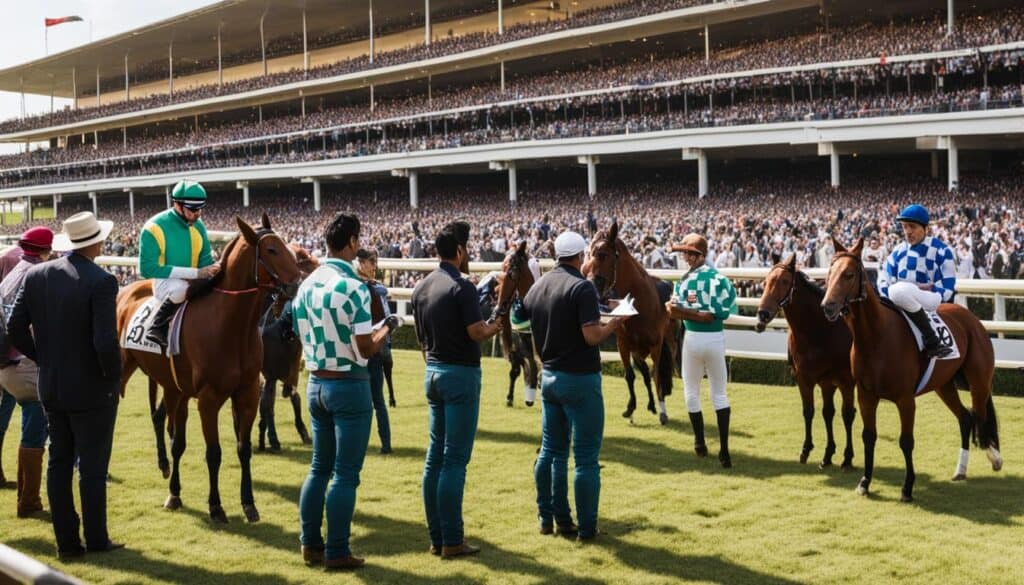
If you’re new to betting on horses, it’s important to start with low-risk bets such as win, place, and show. These basic bets are great for beginners and allow you to get a feel for the process of horse betting. As you gain more experience and confidence, you can gradually move on to higher-risk exotic bets.
But before you start placing your bets, it’s crucial to learn how to read the program and understand the odds. The program contains valuable information about each horse, including its past performances, jockey, trainer, and more. Understanding the odds will help you evaluate the potential payout and make informed betting decisions.
Developing a Horse Betting Strategy
Developing a horse betting strategy takes time and practice. Here are some key tips:
- Evaluate the horse’s past performances: Analyzing a horse’s past performances is essential in determining its potential in an upcoming race. Look for patterns, consistency, and recent performance trends to make more informed decisions.
- Know the jockeys and trainers: Jockeys and trainers play a significant role in a horse’s performance. Familiarize yourself with the top jockeys and trainers who have a high success rate. This knowledge can give you an edge when making your bets.
- Consider track conditions: The condition of the track can greatly impact a horse’s performance. Pay attention to whether the track is fast, muddy, or wet. Some horses excel in specific track conditions, so understanding these factors can help you make more accurate predictions.
- Manage your bankroll: It’s important to establish a budget and stick to it. Set aside a specific amount of money you’re willing to spend on horse betting and avoid chasing losses. Remember that betting on horses involves risks, so be mindful of your finances.
Remember, there are no foolproof strategies in horse betting. It’s a combination of knowledge, analysis, and a bit of luck. Stay informed, study the races, and make calculated decisions based on your research.
“In horse betting, it’s crucial to develop a strategy that suits your risk tolerance and betting preferences. Whether you’re a beginner or an experienced bettor, the key is to stay disciplined and make informed decisions based on the available information.”
Understanding Horse Racing Terms
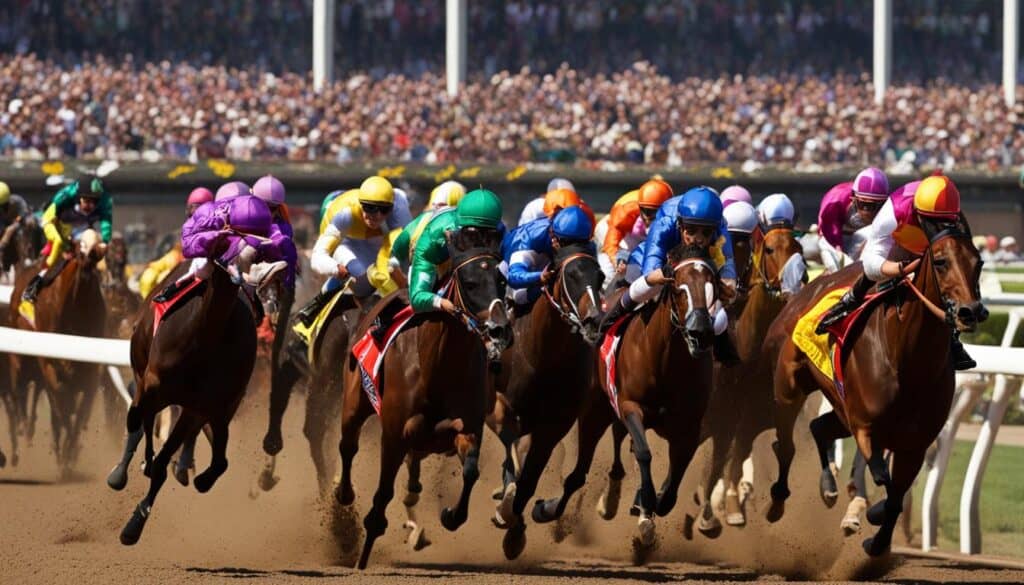
Horse racing is a sport with its own unique set of terms and lingo that can be confusing for beginners. Familiarizing yourself with these terms is essential to navigate the world of horse racing and make more informed bets. Here are some common horse racing terms and gambling lingo that you should know:
- Bounce: Refers to a horse’s poor performance in a race following a good one. It suggests that the horse may have been overexerted or experienced a decline in form.
- Chalk: The term used to describe the betting favorite in a race. It indicates the horse with the lowest odds of winning.
- Overlay: A horse with higher odds than its potential to win. It presents an opportunity for bettors to place a wager on a horse that may be underestimated by the bookmakers.
- Parlay: A betting strategy where the winnings from a successful wager are placed on subsequent races. It allows bettors to accumulate higher potential payouts.
By understanding these horse racing terms and gambling lingo, you’ll be better equipped to decipher race programs, analyze odds, and make more informed betting decisions. Keep these terms in mind as you delve into the thrilling world of horse racing.
Evaluating Horses and Races
Evaluating horses and races in the world of horse racing involves a thorough analysis of various factors. By considering these factors, bettors can make more informed decisions and increase their chances of winning. Here are some key aspects to evaluate when assessing horses and races:
Speed Figures
Speed figures play a significant role in evaluating a horse’s performance. These figures indicate how fast a horse has run in previous races. By examining a horse’s speed figures, bettors can determine its potential speed and compare it to the competition.
Class Levels
Class levels refer to the level of competition in which a horse has been competing. Evaluating class levels helps bettors understand the caliber of competition a horse has faced in prior races. Knowing whether a horse has consistently performed well against strong competition or has been racing at lower levels can provide valuable insights.
Distance and Surface Preferences
Horses often have preferences when it comes to the distance they excel at and the type of racing surface they prefer. Some horses may perform better in shorter sprints, while others may excel in longer races. Additionally, certain horses may have a preference for turf or dirt tracks. Evaluating a horse’s past performances on specific distances and surfaces can help determine its suitability for a particular race.
Current Form
Assessing a horse’s current form is crucial in determining its chances of success. A horse that has been consistently performing well, displaying good speed, and finishing strong in recent races is more likely to continue its winning streak. On the other hand, a horse that has been performing poorly or displaying signs of fatigue may struggle in the upcoming race.
Physicality
Physical attributes and condition play a role in evaluating horses. A horse’s physique, including its build, muscle tone, and overall health, can provide insights into its strength and endurance. Additionally, considering any changes in equipment or the jockey can also impact a horse’s performance and should be taken into account.
By carefully evaluating horses based on speed figures, class levels, distance and surface preferences, current form, and physicality, bettors can make more informed decisions when placing their bets. Analyzing a horse’s past performances and identifying patterns can help in predicting its performance in an upcoming race. It’s important to thoroughly consider the track conditions, any changes in equipment, and the race’s unique circumstances. By employing a comprehensive evaluation strategy, bettors can enhance their chances of success in the thrilling world of horse racing.
Tips for Beginners and Learning Resources
If you’re new to horse racing and betting, it’s recommended to start with low-risk bets and gradually increase your knowledge and understanding. Horse racing can seem overwhelming at first, but with the right resources and guidance, you can navigate the world of horse betting with confidence. Here are some tips to help you get started:
- Start with the basics: Begin by familiarizing yourself with the different types of bets and how they work. Learn about win, place, and show bets, and slowly explore more complex wagers like exacta and trifecta.
- Read books and online guides: There are plenty of comprehensive books and online guides available that cover the fundamentals of horse racing and betting. These resources can provide valuable insights and betting strategies for beginners.
- Watch races: Observing horse races can be an excellent way to learn more about the sport. Take note of the horses’ performances, jockeys’ riding styles, and track conditions to develop your understanding of horse racing dynamics.
- Follow expert analysis: Many racetracks and online platforms offer expert analysis and predictions for upcoming races. Following these commentaries can give you valuable insights into factors like horse form, trainer and jockey statistics, and track biases.
- Utilize online platforms: Several websites and online platforms cater specifically to beginners and provide tips, strategies, and educational resources on horse racing. Take advantage of these platforms to deepen your knowledge.
- Attend live races: If possible, visiting a racetrack and experiencing the excitement firsthand can be a fantastic way to immerse yourself in horse racing culture. You can observe the horses up close, engage with experienced bettors, and get a feel for the atmosphere.
Remember, learning about horse betting is an ongoing process. Practice patience, take small steps, and gradually build your knowledge and expertise. By utilizing various learning resources and gaining practical experience, you can become a confident horse bettor in no time.
The Thrill of Horse Betting
Horse betting is not just about making money, but also about the excitement and thrill of the sport. The adrenaline rush of watching your chosen horse win a race can be incredibly rewarding. Horse racing offers a unique blend of strategy, analysis, and chance, making it a captivating and dynamic activity. With time and experience, you can develop your own betting strategies and enjoy the thrill of the races.
Whether you are at the track or watching from the comfort of your home, the excitement of horse racing is unmatched. The thundering sound of hooves, the cheers of the crowd, and the anticipation leading up to the race create an electric atmosphere. Every race is a new opportunity to test your knowledge and instincts, as well as to experience the thrill of victory.
What sets horse betting apart is the strategic element it involves. It’s not just about picking a horse at random; successful bettors analyze past performances, assess track conditions, consider jockey and trainer stats, and evaluate numerous other factors. This combination of skill and luck keeps the sport unpredictable and exhilarating. The more you learn about the intricacies of horse racing, the more thrilling the betting experience becomes.
So, embrace the excitement and immerse yourself in the world of horse betting. Let the adrenaline fuel your passion for the races and let the thrill of each bet keep you coming back for more. Whether you’re a seasoned bettor or just starting out, horse betting offers an unforgettable experience that combines the love for the sport with the thrill of the gamble.
FAQ
What is horse betting?
Horse betting, also known as horse racing betting, involves placing bets on the final placement of horses in a race.
What are the basics of horse betting?
The basics of horse betting include understanding the different types of bets, such as win, place, and show, and analyzing factors like odds and past performances.
What are the types of bets in horse racing?
The types of bets in horse racing include exacta, place betting, each way betting, double, and daily double.
What are exotic wagers in horse racing?
Exotic wagers in horse racing go beyond the basic bets and involve predicting the placement of multiple horses in one or multiple races, such as exacta, trifecta, pick 6, and pick 4.
What are betting exchanges, and how does the United States market work?
Betting exchanges allow punters to act as bookmakers and set their own odds, while the United States market for horse race betting varies from state to state, with parimutuel betting being legal in 32 states.
What is the Kentucky Derby?
The Kentucky Derby is the most famous horse race in the United States, held annually on the first Saturday in May at Churchill Downs, and offers a wide range of betting opportunities.
What is horse racing like in Hong Kong?
Hong Kong is home to one of the largest horse racing betting circles in the world, with the Hong Kong Jockey Club generating the largest horse racing revenue globally.
What is horse racing like in Australia?
Horse racing is popular in Australia, with the Melbourne Cup, Australia’s most famous horse race, attracting significant betting activity.
What is horse racing like in the United Kingdom?
Horse race betting in the United Kingdom is wide and varied, with the majority of betting done through bookmakers and the off-course horse racing betting turnover amounting to £4.3 billion.
What are some tips for betting on horses?
Tips for betting on horses include starting with low-risk bets, learning how to read the program and understand odds, and evaluating factors like past performances and jockeys and trainers’ success rate.
What are some common horse racing terms?
Common horse racing terms include bounce, chalk, overlay, and parlay, which can be helpful to know when navigating the world of horse racing.
How do you evaluate horses and races in horse racing?
Evaluating horses and races involves considering factors such as speed figures, class levels, current form, and physicality to predict a horse’s performance in a race.
What are some tips for beginners and learning resources for horse betting?
Tips for beginners include starting with low-risk bets and gradually increasing knowledge, and learning resources for horse betting include books, races, and expert analysis.
Why is horse betting thrilling?
Horse betting offers a unique blend of strategy, analysis, and chance, making it a captivating and dynamic activity that can provide an adrenaline rush and excitement.
 Online Gaming Circuit
Online Gaming Circuit




